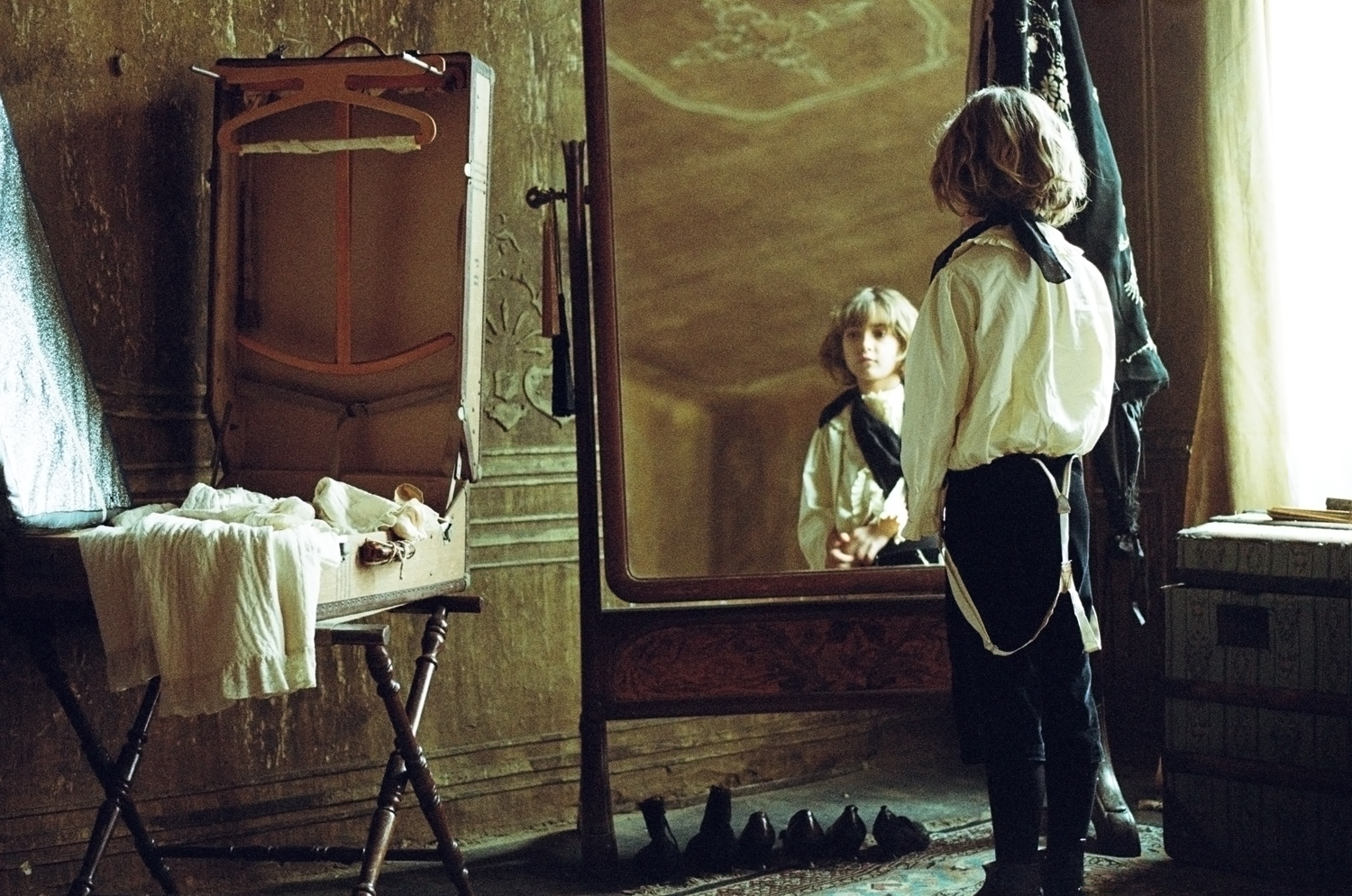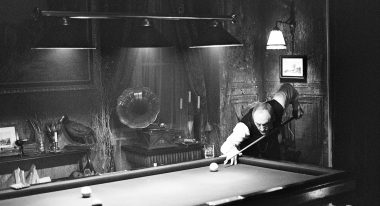 Back to selection
Back to selection
True Crit
Weekly film reviews. by Howard Feinstein
Fabled: The Childhood of a Leader
 Tom Sweet in The Childhood of a Leader (photos: Agatha A. Nitecka)
Tom Sweet in The Childhood of a Leader (photos: Agatha A. Nitecka) Youthful innocents relish playing the part of amateur cartographer for school assignments, drawing prats, or, even more fun, molding contours from papier-mache. Seven-year-old Prescott (Tom Sweet), the subject of Brady Corbet’s astonishing debut feature, The Childhood of a Leader, is no innocent. The film, adapted from Jean-Paul Sartre’s short story of the same title and co-scripted by Norwegian Mona Fastvold, charts his rocky path from angel in his church’s Nativity play to one of the signature faces of the diabolical: totalitarianism.
The scene in which the boy slides his fingers across a wall map of Europe just as it was before the end of the Great War is a portent of its state and his place in it some 15-20 years on. Expressionistic to the max — Prescott is shot like a Caligari-esque character, his hand throwing shadows across the mock-up of the arbitrary political landscape, while the orchestral score rants morbidly — it foreshadows the breakup of the continent following the signing of a peace accord, in large part the result of bad judgment in rewarding the victors and punishing the vanquished. Such dramatic visual and aural effects pound home feelings of both historical truth (archival footage is a big help) and, strangely enough, predestination. Continuity stems as much from mood as from fact. Corbet milks the power of suggestion and takes advantage of its wide reach.

The surroundings are hardly typical for a lad Prescott’s age. The framed map hangs outside a living room in a villa in southern France (with Hungary’s Buda Castle and National Gallery as stand-ins, and low-cost creative solutions devised to obtain desired effects on a paltry $5 million budget), in which his dad, called here the Father (Irish actor Liam Cunningham), hosts a meeting of diplomats arguing points — some fine, some rather broad — in a last-ditch effort to finalize the Paris peace talks, which came to be known as the Treaty of Versailles.
A major player, the Father is undersecretary to Robert Lansing, Woodrow Wilson’s Secretary of State, and, like his boss, a foe of the American president’s ill-fated goal of self-determination. The well-intended strategy split Europe and ex-colonies on other continents into unmanageable entities lumped together on the basis of ethnic, linguistic, and religious kinship, jettisoning prospects of working toward the greater good. At a sticking point in negotiations, the Father parrots Lansing, who rightfully fears future war. “Diplomacy is out!” he complains. The titles in a Pathe newsreel shot at the conclusion of the conference read “Their work is done!,” the punctuation indicating jingoistic pride. Subsequent footage, however, depicts the Fascist military buildup and violence ahead.
Like the Father, the other men are smug and inherently authoritarian, save for the lone journalist, Brit Charles Marker (English actor Robert Pattinson, his virtuosity and range finally exploited), an empathetic survivor of personal tragedy who falls into the role of Prescott’s enabler. With little understanding of the extent of the boy’s psychological mutation, he tries to protect him from what he considers excessive paternal force.
On the fringes of this men’s club are the few women, ornaments really. The Mother (French thesp Bérénice Bejo) is a bossy, vain, and spoiled religious fanatic. Extremely neurotic, she is so unwilling to perform sexually for her husband that when the classic “migraine” doesn’t work, she resorts to the even more transparent “I’m bleeding!” With her son, she is controlling, smothering, and coddling. She is his primary apologist, yet their relationship increasingly becomes a contest of wills. Is it by mere chance that she is originally from Germany, the war’s big loser? I’m asking, because the answer is ambiguous.

Between Prescott and his mom, other females who serve the vast home, including the beautiful young French teacher, Ada (French actress Stacy Martin, from von Trier’s Nymphomaniac), and the lovable old nanny, Mona (a fine Yolande Moreau, also French), a lonely 17-year veteran of the residence, are dismissed, so that the battle is played out without distraction. The latter is too maternal and too beloved by the son for the Mother; the former, in the child’s unforgiving mind, a usurper who crosses the clear line distinguishing masters from servants. One measure of the boy’s warped cleverness is the way he engineers the sowing of her own destruction by Ada. She reads to him from a collection of Aesop’s Fables (the book is almost a character) the story of the lion and the mouse, which ends with the child-friendly, “And the moral is, little friends may prove great friends.” In private, he practices reading the text in order to mislead his mother into thinking he has made such astounding progress that he no longer requires the teacher’s services.
To protect himself from his demanding, overprotective parents, the boy accelerates his propensity for manipulation, taking great delight in embarrassing them publicly in a social milieu that does not easily tolerate deviation from the norm. It is not difficult to do so. Already cutting an androgynous figure, Prescott provokes his hypermasculine father by keeping his blond locks so long he is frequently mistaken for a girl, and by appearing at inopportune times in a frock that is as much femme as heavenly.
The stately home is not only the site of highly disruptive tension among family members — recurring up-and-down movement on open wrought-iron stairways and primitive one-person elevators bisect the fraught spaces, with circular motifs, often rotating, adding a metaphysical spin to the conflicts — but also a warehouse of oversized cold and barren rooms in which hypocrisy and inconsistency threaten to come out of storage at any moment.

Both parents teach Prescott to take the moral high ground, while evidence on the screen suggests each is engaged in an extramarital affair. Practice betrays the honor and religiosity they profess. Corbet coyly follows a lesson on ethical behavior with a scene in which Prescott observes probable adultery between two figures significant in very different ways in molding the boy’s ego and superego during his formative years.
Mean, and shrewd beyond his years, Prescott poses a nasty and revealing query about said liaison that he masks as simply the curiosity of a growing boy — a conscious effort to add to the ongoing friction between his mom and dad, as well as that between his parents and caregivers. We quickly realize that the film is not just about parallels between the preadolescent boy and the course he takes, on the one hand, and on the other, the continent and its imminent implosion (or explosion, depending on how one looks at it). It is heavily weighted toward the boy.
Early in the film, he asks at the family dinner table to recite his prayers in silence, inside his own head. It would have been best had he kept the nascent poison contained. Later, at an extravagant diplomatic banquet celebrating the signing of the treaty, he humiliates his parents when asked to lead the VIPs in prayer. Standing on his chair, a black sling still on his arm (no longer needed, simply a manipulative tool), the accidental result of a beating by the fed-up Father, he screams, over and over, louder and louder, “I don’t believe in praying anymore!” The climax is a slap, metaphorical and actual, in the Mother’s face. Prescott, former cherub in the church play, has embraced the flip side: fallen angel.
The story is timely, especially for the U.S. In this presidential election year, it is facing the greatest threat to democracy since the Civil War split the nation in two. Authoritarianism, extreme manipulation, the disconnect between a moral sense of justice and the proscribed vicious treatment of those placed in an unfavorable slot — there are no limits, it appears.

At this year’s Republican National Convention, messengers not of love but of hate, not of peace, but of war vocalize this misguided detour from a route leading toward greater inclusiveness and increased opportunity. That the alleged plagiarism committed by a speechwriter who scripted the empty words uttered with a pronounced Slovenian accent (itself creepily relevant in this xenophobic campaign) by mail-order potential First Lady Melania Trump (who scrapped the words written for her by two respected professionals) receives more media attention than some of the more horrifying planks in the party’s platform (the southern wall? Bathroom gender requirements?) is a barometer of the degree to which we have undercut the forward momentum that seemed up until now unstoppable, even if it is slow and bumpy.
Corbet’s principal reference materials are well-suited to the Trump era, given their precise renderings of similar mindsets and politics of the 19th and early 20th centuries. Austrian director Michael Haneke is his mentor. The latter’s The White Ribbon is a study of authoritarianism and manipulation in a German village that anticipates Nazism, and his main literary influence, Robert Musil, wrote Young Törless (made into a film by Volker Schlöndorff), in which just witnessing but not interfering with brutality makes the title character guilty. Margaret MacMillan’s book Paris 1919: Six Months That Changed the World details and reevaluates the situation after the war, the tough negotiations meant to formally end it hampered by the disagreements over reparations, and, of course, the debate over self-determination. It documents the fallout from the abundance of wrong choices.
As complicated and daring as the whole concept is, Corbet manages to execute his vision through mise-en-scene and the brilliant soundtrack. No, they often do not work together. That is the point, and it works like a charm, functioning fruitfully as a factor in the ordering of sequences. He professes no interest in psychological cause and effect, opting instead, in his own words, “to depict a series of power struggles in this neurotic home.”

This is no out-of-fashion (thank you, God) Europudding. Loaded with genuine celluloid, Lol Crawley’s camera slowly and smoothly tours the walls, ceiling, and decorations of a massive space, like the den in which Marker and the Father drunkenly intellectualize politics, almost incomprehensibly, during a billiard match, while on the soundtrack, experimentalist icon Scott Walker’s atonal score of strings, horns, woodwind, percussion, and assorted novelties plays counterpoint.
The overall aesthetic flies in the face of Wagnerian harmony–a fairly seamless fusion of the arts–as well as the more contemporary notion of the organic. To drive the point home, Corbet adds for the purpose of contrast scenes of local color, such as a peasant driving his horse and cart, and a gratuitous funeral procession with masks that recall pagan pageantry, and in which the totally disengaged Mother and son oddly participate.
The loud music, which begins and ends with conventional classic flourishes, is punctuated by testy blasts. Discord enveloped by a symphonic sheath, it does not fall back from the magnetic pull of its relatively steady intensity. The images, however, lean more and more toward abstraction, the kaleidoscopic bits and pieces as unclear as the dialogue between Marker and the Father.
The stylistic incongruities are in line with the dissociative nature of Prescott himself. Echoing the sporadic musical screams from the soundtrack are his pathological temper tantrums, with which Corbet segments the film into three chapters. The boy is unpredictable, difficult to pinpoint, being more this-‘n-that than a uniform presence. In the story, Sartre recognizes that children are malleable, and pushes the constantly changing boy to the edge of the abyss. In both story and film, the protagonist’s irreverence and narcissism increase almost exponentially, so that he is left with no one and nothing to believe in except himself. Reality checks? You must be joking.
In Sartre’s story, the central character, Lucien Fleurier, is observed and observes himself from the age of four until his early college years. He concludes to himself, “…there were labels which got stuck on to you one fine morning and you had to carry them for the rest of your life.” In his case, the labels mutate. He is a chameleon, but one that does not return to categories he has exhausted.
In the text, Lucien lets an act he has performed–slaying a Jewish man–determine the defining label: anti-Semitic. Score one for existentialism. It’s about the doing. In the movie, though, the labels around Prescott accumulate and coalesce into an absolute, impenetrable quantity against which these categories no longer much matter: dictator.
